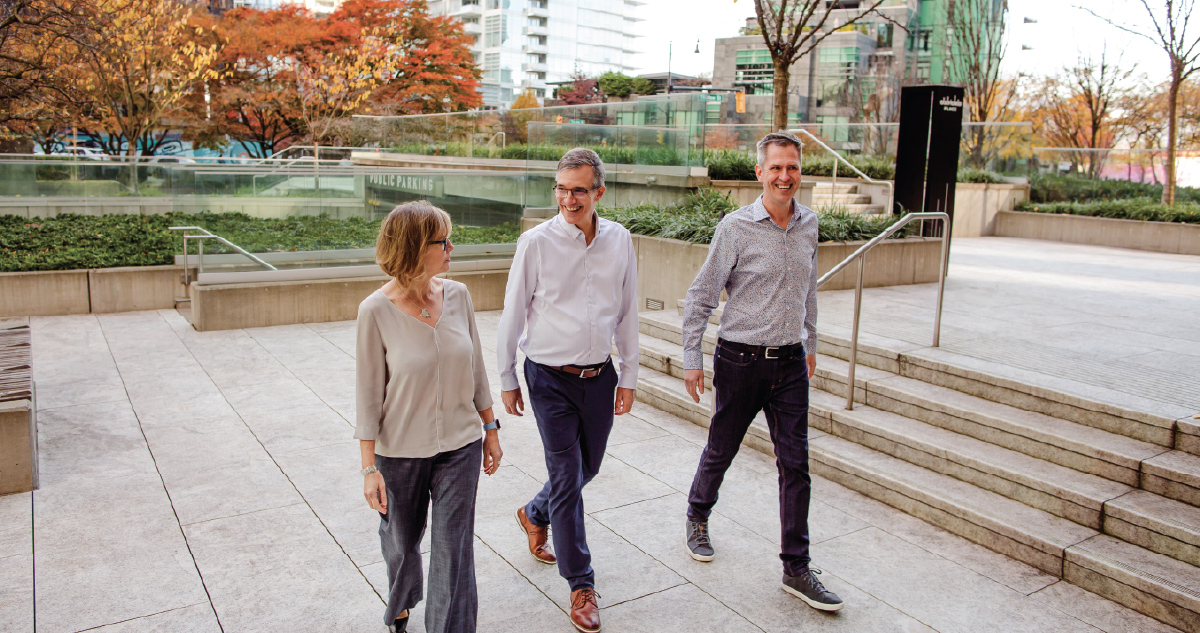Impact Culture: The New Competitive Edge in Talent Retention
Published on January 24, 2025
For leaders driving growth and retention, the data is clear: organizations with strong impact cultures have higher talent retention rates and business performance.
Research from Deloitte found that impact- and purpose-driven companies achieve higher market share gains and grow on average three times faster than their competitors. These organizations also report 30% higher levels of innovation and 49% higher levels of workforce retention.
As one of Real Leaders® magazine’s 2025 Top Impact Companies, Realize Solutions demonstrated that prioritizing social impact alongside business performance creates measurable results. This award validates our approach: building a strong impact-driven culture enables us at Realize to attract and keep exceptional people who deliver outstanding results for our clients. Integrating social impact into our business model has deepened client trust, strengthened community partnerships, and driven sustainable growth.
Similarly, our B Corp score of 128.8 – the highest amongst management consultancies in British Columbia – reflects effective concrete practices that drive both employee engagement and business growth.
Our B Corp score isn’t just a metric; it represents our systematic approaches to talent management that other organizations can adapt and implement.
Impact culture offers a framework that addresses multiple business challenges simultaneously: retention, innovation, and sustainable growth. Since our founding in 1998, we’ve successfully fostered an environment where exceptional individuals choose to stay and contribute their best work.
How did we do it? Read below about our field-tested frameworks and strategies that drive talent retention through impact culture that you can apply within your own organization.
The shifting talent landscape
Impact culture isn’t just another corporate initiative – it’s a systematic approach to business operations where social responsibility and business performance reinforce each other. At its core, impact culture means building organizational practices that create measurable value for all stakeholders: employees, customers, communities, and shareholders.
When it comes to talent attraction and retention, high-performers across all industries are increasingly seeking out employers who have a strong impact culture. These individuals prioritize employers who demonstrate clear social impact alongside business success. They want environments where they can develop their skills while contributing to meaningful change, and they are willing to walk away if either element is missing.
Impact culture fundamentally aligns business operations with broader societal benefit while maintaining strong financial performance. Organizations that authentically integrate purpose with profit aren’t just doing good, they’re building more resilient, high-performing teams capable of driving long-term success.
Building blocks of impact culture
At the heart of every impact-driven organization lies a carefully constructed cultural framework that balances business excellence with social responsibility. Here are two fundamental building blocks that we have in place and have helped others implement to create sustainable competitive advantage: a fair compensation framework and intentional leadership.
Fair compensation framework
Did you know that the global average CEO-to-worker pay ratio is 246: 1?
While market-rate compensation remains essential, the pay ratio between most senior and junior is a facet of compensation that the vast majority of organizations ignore. Along with being a certified Living Wage Employer, Realize has a longstanding internal policy that that the compensation ratio between our most senior and junior team member will never exceed 3.5. : 1.
This framework isn’t just about numbers – it’s about creating a workplace where every contributor feels valued and invested in organizational success. Our framework has helped create team stability and significantly reduced the ever-growing costs associated with turnover. Benevity reported that the cost of replacing an entry-level employee is estimated to be around 30% to 50% of their annual salary, 150% for mid-level employees, and 400% for seasoned and specialized team members.
In addition, our framework and approach has proven particularly effective in attracting and retaining excellent talent by demonstrating our commitment to pay equity through action rather than just words.
Leadership strategies: accountability and operational transparency
Successful and resilient organizations thrive on trust and openness. Our senior leadership maintain an open-door policy to remain accessible and engage with all levels of the organization. John Kay, our CEO leads by example and ensures that organizational strategies and challenges are shared openly with all team members, letting all staff see how their individual work and roles fit in and contribute, particularly in times of uncertainty.
We also maintain radical transparency about company strategy and financial performance, which has created an environment where all team members feel genuinely invested in organizational outcomes. This approach has fostered unprecedented levels of psychological safety, enabling teams to innovate, take calculated risks, and deliver exceptional results for our clients and community.
While such radical financial performance transparency may not be feasible for enterprise-sized organizations, we highly encourage leaders to regularly engage in two-way dialogue about company strategy. These dialogues give leaders a great opportunity to demonstrate accountability to staff. Did the leader follow up on what was previously discussed and/or promised? Is the leader sharing and connecting staff to current and futural company goals?
These foundational elements create a self-reinforcing cycle where fair compensation and organizational transparency attract exceptional talent, who in turn drive the innovation and results that enable continued investment in our people.
Cultivating engagement through purpose
Our experience shows that purposeful engagement, backed by concrete professional development and community impact initiatives, helps organizations create their own a sustainable advantage in talent retention and performance.
Retention strategy: professional development with purpose
In our experience, we have found that meaningful professional development must align with both individual growth and organizational impact. If your organization wants to turn all of your staff into top talent, each individual must be given the security of “failing safely” in order to truly innovate and grow.
When leaders trust and encourage their staff to develop new ideas without the threat of losing their job if said idea doesn’t work, the organization itself becomes more agile and innovative. Employees will gladly stay and invest in an organization where they feel empowered to contribute ideas, drive changes, and see their contributions shape the company’s operations.
Leaders should also provide their staff with both the time, tools, and opportunities to invest in their own continuous learning. For our own team, all staff receive daily curated content from leading business publications including Harvard Business Review, Wall Street Journal, and Stanford Social Innovation Review, ensuring they stay at the forefront of industry trends and innovative thinking. However, knowledge consumption alone isn’t enough. We’ve also implemented regular “innovation hours” where teams can apply these insights to real-world challenges. This approach has led to tangible results – from process improvements that have been adopted company-wide to team members being invited to speak at industry conferences, such as the Co-operators Member Experience Summit or National Sustainability Society Conference. Cultural competency is also crucial for modern business leadership. Our commitment to Indigenous awareness training has expanded our capabilities and lead to new partnerships.
Performance strategy: community impact as a performance driver
We’ve discovered that community engagement isn’t just about corporate social responsibility – it’s also a powerful driver of employee satisfaction and skill development. In 2023, our team contributed 531 hours of pro bono work to charities and non-profits, providing opportunities for employees to apply their expertise in new contexts while making meaningful community contributions.
Pursuing rigorous third-party certifications, such as B Corp and Buy Social Canada, has allowed for continuous improvement in all aspects of our work. For example, both certification requirements have pushed us beyond conventional supplier diversity programs. We are committed to sourcing at least 50% of our core supplies from local independent suppliers, with a particular focus on suppliers who are:
- Majority owned by women, BIPOC, or other traditionally under-represented groups
- Certified by Buy Social Canada, B Lab, or comparable social screening system
- Certified Living Wage Employers
- Social enterprises, co-operatives or other forms of community-owned businesses.
Embedding similar community impact-focused initiatives throughout your organizational practices can not only elevate your organization’s presence and positive contributions within your communities, but also demonstrate to all organizational stakeholders – staff, clients, shareholders, partners – how you live your mission and values.
Next steps
For leaders looking to enhance their organizational resilience while driving meaningful change, the path forward requires intentional focus on building cultures that prioritize both performance and purpose. As organizations navigate the complexities of talent retention and sustainable growth, balancing profit with purpose has emerged as a compelling competitive advantage.
Our recognition as a 2025 Top Impact Company by Real Leaders® underscores our approach to transforming organizational performance through strategic leadership and governance. Having an impact-driven workplace culture isn’t just good for society, it’s good for business.
Ready to explore how your organization can develop a more impactful approach to leadership and strategy? Contact our senior advisory team to schedule a confidential consultation about creating an impact culture.
Contributors




